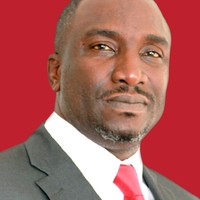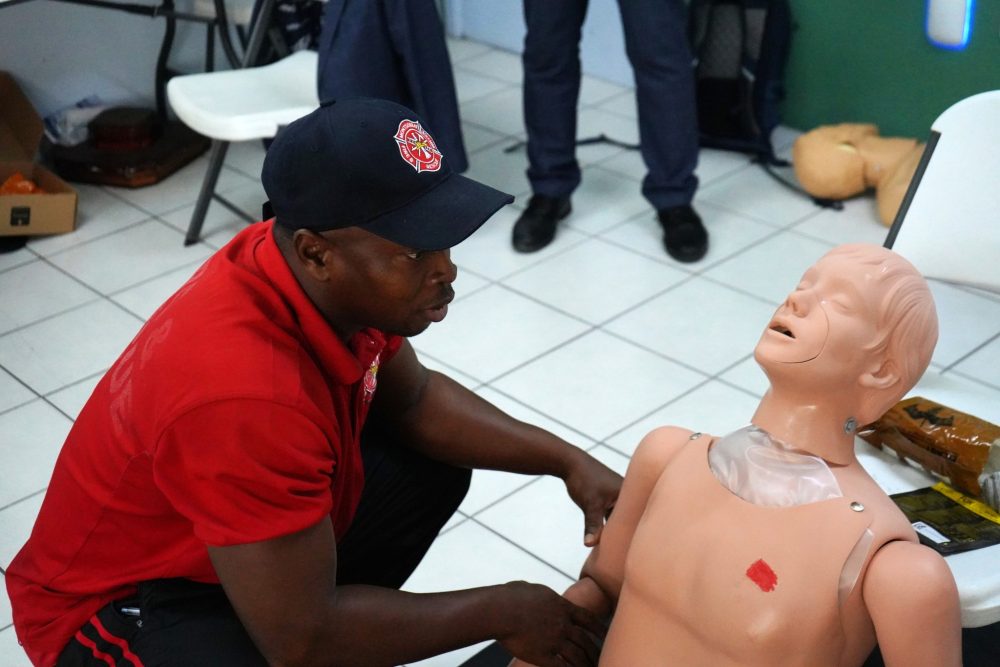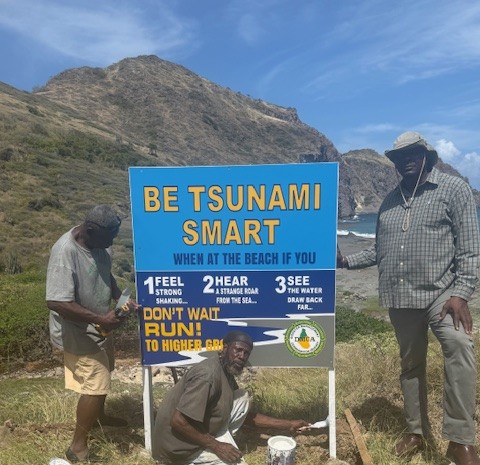On November 1st, 2016, Premier Romeo, through the Office of the Premier, produced a paper entitled “Building Montserrat’s Future”.
The paper was presented at the Joint Ministerial Conference (JMC) at the end of November 2016 and highlighted that in order for Montserrat to be self-sufficient, strategic capital investments must be a part of the plan. The paper acknowledges the work done by DFID in Montserrat over the years, but points out that many viable projects have been unduly delayed through a pattern of “fits, starts and restarts”.

Premier Romeo presented the paper at the JMC and the arguments were well received, and have helped to renew and strengthen our development partnership with the UK Government.
The document was used as a part of the ongoing budget support Financial Aid Mission discussions and as a point of reference for the Montserrat Transformation Programme. The Premier is now releasing the November 1 Premier’s Office Update, “Building Montserrat’s Future” to the media and to the public. The document will be uploaded to the Government of Montserrat Web site, will be communicated to local media houses and a copy will shortly be placed in the Public Library.
Download the PDF version here – building-montserrat-future-po-jmc-nov-1-2016-4
Read the full presentation below:
In the 1980’s, there was a buzz in the air, that Montserrat was a red-hot place to be; with a bright future. We were self-financing for our recurrent budget. The Air Studios, Beachettes and other “Expat” settlements, American University of the Caribbean, and Radio Antilles were pointing a way to a rosy future. Then came hurricane Hugo in 1989 and a few years later we found ourselves facing an erupting volcano on July 18th 1995.
In just two to three years, we lost access to two-thirds of our land, lost our capital with its infrastructure, lost our sea port and our airport, as well as two-thirds of our population; who became involuntary exiles, mostly in the UK. Our economy fell by about a half, so we were forced back into grant- in- aid status under DfID’s oversight.
However, with the destructive volcanic eruptions now fading into the past and despite delays with key infrastructure projects, there is an opportunity to rebuild.
Yes, our mission today is to rebuild our nation and to move Montserrat back to economic self-sustainability. For, today Montserrat stands at a critical point in its history.
DfID itself highlighted what we urgently need to do, in its 2012 MDC Business Case:
i. “develop a tourism-driven capital town . . . as the principal location for new foreign direct investment, tourism, housing and civic facilities”;
ii. “improve physical access to Montserrat through the development of a port and breakwater . . .” ;
iii. “improve and sustain access through investments in air and sea access assets”;
In the same 2012 business case, DfID also pointed out:
“There is currently no prospect of the private sector making significant investment in major capital investments or in complementary institutional support. This is because the market for leisure and commercial transport to Montserrat is perceived by the private sector as too small and high risk. Initial and catalytic investments are therefore required by the public sector and these need to be properly designed and implemented . . .”
Thirdly, in DfID’s 2012 report on its “Work with the Overseas Territories,” we can read how:
“ . . . Together with the Government of Montserrat (GoM) we are appraising investment possibilities which could help boost Montserrat’s GDP and have the potential to substantially improve GoM revenues. If appraisals prove to be positive then the UK Government is likely to provide the majority of the public funds needed for any investments made.” [ p.6]
DfID’s policy mandate to aid in Montserrat’s re-development is clear. DfID’s own analysis lays out the key priorities. For, under the FCO’s acknowledgement of the legal force of the UN Charter Article 73, “reasonable assistance needs of overseas territories” hold “a first call” on the UK aid budget. Under the same legal force, in order to “ensure, with due respect for the culture of the peoples concerned . . . political, economic, social, and educational advancement,” DfID is also committed to supporting sound, economy-transforming investments such as the £285 million St Helena airport. However, while we must acknowledge a lot of good work by DfID over the years, it is also fair comment that many credible development projects for Montserrat have been unduly delayed through a pattern of starts and stops, and re-starts. Some necessary projects have simply sat there, mysteriously deadlocked and not moving forward for months or even years on end.
(Some projects that did finally get through were cut down to an inadequate level.)
For instance, our sea port depends on an evacuation jetty made from slabs sitting on sand, which is not protected by a breakwater; while, our airport is inadequate also. After 20 years and several Healthcare reviews we are still being told that Montserrat will have to wait for yet more years to get adequate hospital facilities. Evacuee housing projects in Davy Hill and Lookout that were insisted on over the protests of knowledgeable local builders have proved ill-suited to our climate and needs, requiring costly re-work.
We also urgently need a high speed ferry, an appropriate tourist cruise ship-ready jetty protected by a break-water
and the ability to reliably transport cargo by sea. We need a Fibre Optic Cable for digital access (and yes, this project is moving ahead). Access, on the whole, is a critical challenge.
We need a new capital town. We must move Montserrat ahead on tourism promotion and other “catalytic” development projects such as Geothermal Electricity generation (building on the drilling of the three wells), an adequate hospital, socially provided and affordable housing, a purpose-built fast ferry, improved schools, etc.
To accomplish these things, we must work in partnership with FCO, DfID and other Departments of HMG. We need to ensure that when Technical Cooperation Officers come to us, they have an action plan to help us build our capacity so that our local government, too, will be able to stand on its own two feet. Most of all, we must stand shoulder to shoulder as a united people determined to rebuild and redevelop our homeland until we can stand on our own two feet once more. (None of this is new; our challenge has long been how to move forward without further undue delays, road-blocks, and inadequate projects.)
In a meeting with DfID Minister Hon. Desmond Swayne in 2015, we agreed with HMG on the need to strengthen partnership, for enhancing governance and putting in place a sound economic business plan that will credibly lead to sustainable growth in our economy. As proof of our commitment, over the past year and more, we have been working to put in place some key, foundational policy initiatives:
Cabinet approved a Policy Agenda, in FY 2015/16, which set priorities for Access, Health, Human & Social Development, the Environment and Governance;
Key priorities identified for 2017/18 are: Energy, Tourism, and infrastructure (including ICT);
A Programme Management Office is being set up under the Ministry of Finance, to host and expedite our priority development projects; on a set timeline. This will improve our value for money business cases, project and programme governance, transparency, and risk management. Such measures will help us improve our ability to effectively implement a sound development programme.
We re-vamped our strategic planning process to align with the Policy Agenda, and integrated it with the budgeting process.
The Government of Montserrat (GoM) has set in place a new capital budgeting process, to better evaluate capital projects and ensure value for money; this will be integrated with the Programme Management Office.
We have supported the Public Sector Reform Programme, Phase 2, which has put in place foundational structures for transformation of governance under phase 3.
We are creating a Child Protection Unit (CPU), to address child safeguarding matters through a centre of excellence.
A Children (Care and Adoption) Bill was just passed into law and will provide much of the required framework for the CPU.
As priority, we are continuing to work with FCO and our Governor to improve security and ensure that Montserrat remains safe, secure and tranquil; all central to our culture and to our tourism product.
We published a citizen’s guide to the budget and will do so again as part of our preparations for the FY2017/18; we also have in place a draft National Performance Framework.
We have put a new Energy Policy in place, as an updated framework for development of a sustainable energy economy that attracts investors for tourism, industry and agriculture.
The long awaited Housing Bill was passed into law October 25th, 2016 and it will help us move forward to continue with emergency, social and affordable housing initiatives for our people.
We will continue to set out sound policy priorities and we will also put in place solid structures for promoting and strengthening aid effectiveness, policy-making, project management, strategic decision-making, prudent risk management and value for money in allocation of funds.
For this to work, the alignment of HMG‘s efforts to our development priorities is fundamental and should be shaped by Montserrat’s long established British Heritage as an Overseas Territory, and the commitment of Her Majesty’s Government to the people of Montserrat, and other OT’s under the June 2012, FCO white paper.
To achieve sound, sustainable development, we must work in partnership with FCO, DfID and other Departments of
HMG. To help us put such a partnership in place, we need to negotiate a new Development Partnership Memorandum of Understanding. This DP MoU should have a list of agreed priority projects with committed funds and a timeline that will help to guide us in working together to rebuild and redevelop Montserrat. This will support us as we come together as a people around a determined purpose to rebuild and redevelop until we can stand on our own two feet once more.
As a first step, we will need several “shovel-ready,” jobs-creating projects that will help “kick-start” strong growth in our economy. For instance, the A1 Main road needs to be completed through a Phase II project; the Government Accommodations Programme can and should move on to its further phases; the Little Bay Town can be further developed; up to 400 plus social and affordable houses can be built; we can develop tourist sites, including a Volcano Park/ “New Pompeii” center in Plymouth; development of programmes for the youth, parks and leisure facilities, and the like – putting our people to productive work. These projects would then feed into the longer-term, transformational development projects.
So, as our economy recovers, as key infrastructure are put in place and as jobs are created, hundreds of Montserratians who have been forced to leave Montserrat can begin to come home. This, too, will further boost our
economy, as these people will need to build or buy houses, make a living and will have skills that build up our capacity.
With the destructive volcanic eruptions now fading into the past, this is the time to move Montserrat forward. Another several decades of recurrent budget aid, directly funded by the British tax payers is not in their or
our best interest. The choice at this economic crossroad is clear; strategic capital investments to return Montserrat to self-sufficiency or continued annual Aid for generations to come. Redevelopment and the hoped for economic self-sufficiency will clearly not happen overnight, but we can and should speed up the rebuilding process; starting today.
Through God’s help, we will do so.
Discover more from Discover Montserrat
Subscribe to get the latest posts sent to your email.



